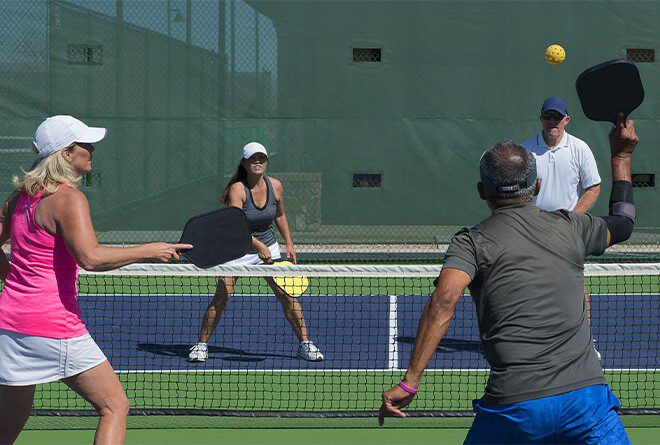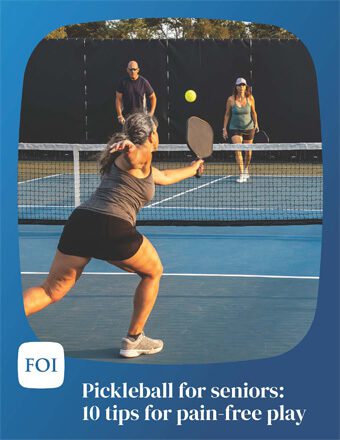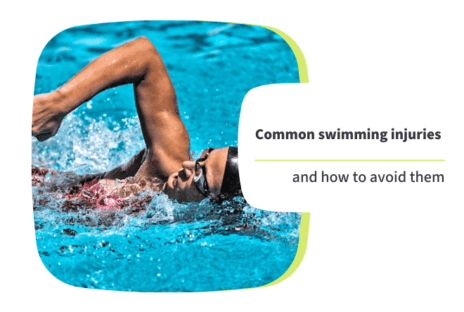4 common causes of pickleball shoulder pain

Did you know Florida has more pickleball courts than any state besides California? It’s exploding in popularity because the low-impact sport is simple to learn and a good way to stay active at any age. But, since the game isn’t as physically intense, it can be easy to forget to warm up or continue playing for several hours at a time. Unfortunately, doing either sometimes creates (or worsens) pickleball shoulder pain.
Keep reading to learn about the warning signs of injury, when to see a specialist for shoulder pain treatment, and how to stay healthy when playing pickleball so you can enjoy your time on the court (and avoid soreness).
4 common causes of pickleball shoulder pain
As the sport continues to grow, so does the number of people wondering, “Why does my shoulder hurt when I play pickleball?” Hopefully, it’s from high-fiving your partner after a lot of victories. But most likely, shoulder pain from pickleball can signal a potential injury.
One of these conditions is typically the culprit:
- Rotator cuff injuries
- Shoulder impingement and bursitis
- Labral tears
- Biceps tendonitis
1. Rotator cuff injuries
One of the most common pickleball shoulder injuries affects the rotator cuff. The rotator cuff is a set of muscles and tendons that help move the shoulder joints. Repeatedly swinging hard and reaching up to hit the ball can stress the muscles and tendons. If they don’t get enough warm-up and rest, they can become inflamed or tear.
The rotator cuff is one of the areas commonly prone to overuse in pickleball, thanks to the frequent overhead playing motions and slicing technique. Playing without rest breaks or correct swing form can lead to rotator cuff tendonitis and tendon tears.
What are examples of pickleball rotator cuff injury symptoms?
- Recurring shoulder pain, especially during or after play
- Discomfort sleeping on the affected shoulder
- Loss of strength
- Limited range of motion
2. Shoulder impingement
A shoulder impingement syndrome is a spectrum of disorders ranging from inflammation of the bursa, also known as bursitis, which is the lubricating sac that allows smooth gliding of the rotator cuff under the acromion bone to inflammation and, in more severe cases, tearing of the rotator cuff tendon(s). When you lift your arm, the tendon passes through a narrow space at the top of the shoulder. Repetitive catching or rubbing on the bone causes pain, inflammation and possible tears.
In pickleball, the tendon can become inflamed by repeatedly reaching overhead for high balls, causing the tendon to rub against the shoulder blade. The symptoms can range from pain with overhead activity without weakness in lower-grade injuries such as bursitis to pronounced weakness with large rotator cuff tears. An evaluation is often necessary to pinpoint the source of pain.
How do you know if you might have shoulder impingement from pickleball?
- Pain or weakness reaching overhead, backward or to the side
- Pain near the top of the arm or down the side
- Pain at night lying on the sore shoulder
3. Labral tears
Your shoulder’s labrum is the soft tissue bumper surrounding the socket, or glenohumeral joint. Its main function is to maintain the stability of the ball and socket joint. It can tear from overuse or an acute injury.
Repetitive motions and relative overuse of the shoulder in pickleball create stress across the labrum and can lead to painful tears.
The job of the labrum is to keep the ball joint in place in the socket and allow the shoulder to move smoothly. When there’s a shoulder labral tear, it can feel like the joint is “catching.” Overhead motions are a common cause.
What are some common signs of shoulder labral tear?
- Deep soreness
- Sudden acute pain
- Resistance, like popping, clicking or locking in the shoulder
- Pain while lifting the arm overhead or picking up an object
- Decreased range of motion
- Instability or feeling like the shoulder might pop out of place
4. Biceps tendonitis
The biceps tendons connect the shoulder and elbow to the biceps muscle (the upper arm that might bulge when flexed). The bicep tendon is at the front of the shoulder/upper arm, where pain may occur.
Swinging the paddle with a lot of force or performing repetitive ground strokes can strain the tendon and cause inflammation. Because the ball is light, it often takes a big swing to get it over the net. Repeating this motion accelerates the problem, eventually leading to biceps tendon inflammation.
Signs of upper bicep tendon inflammation caused by pickleball
- Deep, throbbing pain at the front of the shoulder
- Tenderness
- Swelling
- Loss of strength
- Decreased range of motion
Other potential sources of shoulder pain from pickleball
Pickleball players who weren’t already active when they picked up the sport and who don’t consistently stretch before and after playing are susceptible to pickleball injuries. In addition to the most common problems discussed above, other pickleball shoulder injuries that are on the rise include exacerbation of pre-existing arthritis or calcific tendinitis, fractures, and instability.
FAQs about pickleball shoulder pain
Florida Orthopaedic Institute (FOI) offers this advice on treating a sore shoulder from pickleball and other common questions.
What helps shoulder pain from pickleball?
To decide how to treat a sore shoulder from pickleball, pay attention to whether the pain is getting worse. Consult a physician for a proper diagnosis and customized treatment plan before it becomes more severe. If you catch a rotator cuff tear early, you might be able to avoid surgery.
A treatment plan might include ice, rest, anti-inflammatories, cortisone injections, physical therapy, exercises to strengthen the area, use of biologics, or minimally invasive outpatient surgery.
Can you play pickleball with a bad shoulder?
Avoid playing if you are experiencing discomfort, pain, limited range of motion, swelling, or clicking sounds. Those are potential signs of injury. Seek medical attention before continuing to play, or rest and treat the symptoms at home until they resolve. If you have a small rotator cuff tear, for instance, it can increase in size with repetitive overhead swinging.
What can you do to prevent experiencing a sore shoulder from pickleball?
The best way to keep your shoulders healthy so you can continue to play pickleball is to maintain a disciplined routine of warm-up and cool-down exercises.
- Stretch the muscles and joints around the shoulder and strengthen them. This applies to the entire body, too, because it’s all connected. For instance, a stiff spine, a weak core or weak thigh muscles can cause the shoulders to become more susceptible to injury.
- Maintain proper technique, and be aware of your body position and movement during play.
- Give your body enough time to rest to recover.
- Hydrate and consume a balanced and healthy nutrition.
- Consult with your physician prior to play in the setting of medical problems of the heart, lungs, etc.
Pickleball’s benefits outweigh its risks
Pickleball’s growing popularity is a sign many find it a fun, social pastime activity. And, as a low-impact sport, it can help you maintain flexibility, strength, and a healthy weight—especially when paired with a sensible diet.
That said, while all of the swinging involved in playing can take a toll on your shoulders at any age, pickleball for seniors carries an even greater risk for injury. You might think there’s no such thing as too much pickleball, but as you age, your tendons aren’t as elastic as they once were, increasing the chance for overuse injuries.
The good news, though, is there are things you can do to prevent or minimize the severity of some conditions that cause pickleball shoulder pain, such as sticking with a routine that involves regular preparation and recovery activities, like dynamic stretching, slow warm-ups and proper cool-downs.
Let’s defeat your pickleball shoulder injury together
Many pickleball injuries have overlapping symptoms, which is why getting an accurate professional diagnosis is crucial to safe, effective treatment. You don’t have to look like a serious athlete to seek treatment for a sports-related injury.
Whether you have a pickleball knee injury or shoulder pain from the sport, we can help. Here at Florida Orthopaedic Institute, our world-class team of physicians has expertise in every area of orthopedics and includes some of the country’s most recognized orthopedic doctors.
Don’t wait to schedule an evaluation with a specialist at one of our many convenient locations in Central Florida. Call us or request an appointment today.
Medically reviewed by Dr. Haidamous & Dr. Reintgen
You might also like:
- Dr. Christopher Baker on Fox 13: Preventing Pickleball Injuries
- Conservative Treatment Options Before Joint Replacement Surgery
- Patient Story: Reverse Shoulder Surgery

Pickleball for seniors: 10 tips for pain-free play
About Florida Orthopaedic Institute
Founded in 1989, Florida Orthopaedic Institute is Florida’s largest physician-led orthopedic group. It provides expertise and treatment of orthopedic-related injuries and conditions, including adult reconstruction and arthritis, foot and ankle, general orthopedics, hand and wrist, orthopedic trauma, shoulder and elbow, spine, interventional pain management, sports medicine, podiatry, physical medicine and rehabilitation, chiropractic services, and physical and occupational therapy, among others. The organization treats patients throughout its surgery centers in North Tampa, South Tampa, and Citrus Park, at several orthopaedic Urgent Care centers and at office locations in Bloomingdale, Brandon, Citrus Park, Gainesville, Lakeland, Northdale, North Tampa, Ocala, Palm Harbor, Riverview, South Tampa, Sun City Center and Wesley Chapel.
October 31, 2024


